-
 Bitcoin
Bitcoin $83,070.5743
1.36% -
 Ethereum
Ethereum $1,846.3042
2.43% -
 Tether USDt
Tether USDt $0.9999
-0.02% -
 XRP
XRP $2.0963
0.60% -
 BNB
BNB $608.2199
1.22% -
 Solana
Solana $125.8573
0.22% -
 USDC
USDC $0.9999
-0.02% -
 Dogecoin
Dogecoin $0.1694
2.47% -
 Cardano
Cardano $0.6718
2.62% -
 TRON
TRON $0.2355
1.18% -
 Toncoin
Toncoin $4.1426
5.41% -
 Chainlink
Chainlink $13.6470
2.68% -
 UNUS SED LEO
UNUS SED LEO $9.1865
0.93% -
 Stellar
Stellar $0.2663
0.74% -
 Avalanche
Avalanche $19.3694
3.55% -
 Shiba Inu
Shiba Inu $0.0...01272
4.45% -
 Sui
Sui $2.3128
1.61% -
 Hedera
Hedera $0.1642
1.69% -
 Polkadot
Polkadot $4.1212
2.20% -
 Litecoin
Litecoin $84.3399
-0.44% -
 MANTRA
MANTRA $6.2758
0.67% -
 Bitcoin Cash
Bitcoin Cash $308.1896
3.51% -
 Bitget Token
Bitget Token $4.5876
1.77% -
 Dai
Dai $0.9999
0.00% -
 Ethena USDe
Ethena USDe $0.9997
-0.09% -
 Pi
Pi $0.7183
1.48% -
 Hyperliquid
Hyperliquid $13.4222
7.75% -
 Monero
Monero $217.7771
0.39% -
 Uniswap
Uniswap $6.0515
1.94% -
 Aptos
Aptos $5.2993
1.42%
How to verify the validity of an Ethereum wallet address?
Verify Ethereum addresses by visually inspecting for "0x" prefix and alphanumeric characters, using exchange tools for checksum validation, and checking blockchain explorers like Etherscan for transaction history. Never rush; irreversible loss is possible with errors.
Mar 25, 2025 at 12:07 pm
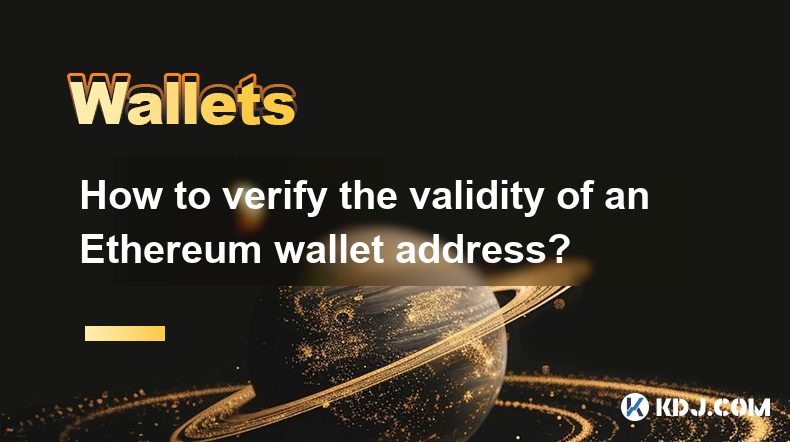
How to Verify the Validity of an Ethereum Wallet Address?
Verifying the validity of an Ethereum wallet address is crucial to prevent sending your funds to the wrong recipient, resulting in irreversible loss. A seemingly minor typo can lead to significant financial consequences. This article will explore various methods for ensuring you're interacting with a legitimate Ethereum address.
First, understand that an Ethereum address is a unique identifier, typically a 42-character alphanumeric string beginning with "0x". This address represents a specific account on the Ethereum blockchain. Simply possessing a string of characters that looks like an address doesn't guarantee its validity. It must correspond to an actual account on the network.
One of the simplest methods is visual inspection. Check for any typos or inconsistencies. A valid address will always start with "0x" and contain only alphanumeric characters (0-9 and a-f). Any other characters indicate an invalid address. Pay close attention to each character; a single misplaced digit or letter renders the address unusable.
Many cryptocurrency exchanges and wallet providers offer address validation tools. These tools often perform checksum validation. This process involves checking a built-in error-detection mechanism within the address format. If the checksum doesn't match, the address is invalid. Look for this functionality within your chosen platform's interface. This is usually integrated into the send/receive function itself.
Blockchain explorers are invaluable resources for verifying Ethereum addresses. Websites like Etherscan allow you to input an address and check its existence on the Ethereum blockchain. If the address is valid, the explorer will display transaction history, balance, and other relevant information associated with that account. The absence of any data suggests the address is invalid or hasn't been used yet.
Using a third-party address validator can offer an extra layer of security. Numerous online tools are available, specifically designed to validate Ethereum addresses. These tools often combine checksum verification with blockchain lookup, providing a more comprehensive check. Always exercise caution when using third-party tools and ensure you're using a reputable source.
Beyond the technical aspects, context is vital. Always verify the address through multiple channels if possible. If you're receiving an address from an email, cross-reference it with the sender's official website or social media. Be wary of unsolicited requests for cryptocurrency; never send funds unless you are absolutely certain of the recipient's identity and address validity.
Consider the source of the address. If you received it through an unofficial channel, such as an unsolicited email or message, treat it with extreme caution. Legitimate businesses and individuals will usually provide clear and reliable ways to verify their payment information. Never send funds based solely on an address you've received through untrusted means.
Remember, the consequences of sending funds to an invalid address are severe. Cryptocurrency transactions are irreversible. Always double- and triple-check the address before initiating any transfer. Taking the time to validate the address is a small price to pay for the security of your funds. Carelessness can lead to permanent loss.
While tools and methods exist to verify an address, human error remains a significant factor. Always maintain a meticulous and cautious approach when handling Ethereum addresses. A thorough verification process is paramount to secure your cryptocurrency holdings. Never rush the process.
Common Questions:
Q: What happens if I send ETH to an invalid address?
A: The ETH will be lost permanently. There's no way to recover funds sent to an incorrect or non-existent address.
Q: Can I recover ETH sent to an invalid address?
A: No. Ethereum transactions are irreversible. Once sent, the funds are gone.
Q: Are all 42-character strings starting with "0x" valid Ethereum addresses?
A: No. While they might look like valid addresses, they need to pass checksum validation and exist on the blockchain to be considered valid.
Q: What is a checksum in the context of Ethereum addresses?
A: It's an error detection code built into the address format. It helps prevent typos from causing funds to be sent to the wrong address.
Q: Why should I use a blockchain explorer?
A: Blockchain explorers provide independent verification of the address's existence and transaction history, adding an extra layer of security to the verification process.
Q: What if the blockchain explorer shows no transactions for the address?
A: This might indicate the address is either new (and hasn't received any transactions yet) or invalid. Further verification steps are necessary.
Disclaimer:info@kdj.com
The information provided is not trading advice. kdj.com does not assume any responsibility for any investments made based on the information provided in this article. Cryptocurrencies are highly volatile and it is highly recommended that you invest with caution after thorough research!
If you believe that the content used on this website infringes your copyright, please contact us immediately (info@kdj.com) and we will delete it promptly.
- Bitcoin (BTC) Recovers to Around $83,000, a 1.4% Increase Over the Past 24 Hours.
- 2025-04-01 15:10:12
- Ethereum (ETH) Struggles as ETF Outflows Hit $409M; Whale Deposits 6,131 ETH Amid Market Panic. Is a Deeper Selloff Ahead?
- 2025-04-01 15:10:12
- Gutter Cat Gang (GCG) GANG Token Launch on Apechain Runs into Technical Issues
- 2025-04-01 15:05:12
- Ethereum (ETH) Navigates Turbulent Waters as Whales Sell and Liquidations Loom
- 2025-04-01 15:05:12
- Solana (SOL) Price Faces Bearish Pressure: Technical Analysis and Consolidation Pattern
- 2025-04-01 15:00:12
- Cryptocurrency Market Caps Double-Digit Losses to End Q1 on a Sour Note
- 2025-04-01 15:00:12
Related knowledge
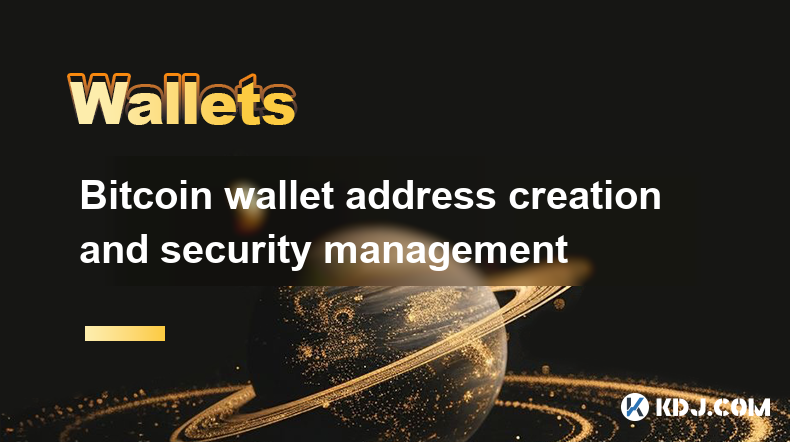
Bitcoin wallet address creation and security management
Mar 31,2025 at 10:56pm
Understanding Bitcoin Wallet AddressesA Bitcoin wallet doesn't store Bitcoin directly. Instead, it stores private keys which are long strings of characters. These keys grant access to your Bitcoin. Your public key, derived from the private key, is used to generate your Bitcoin wallet address, a unique identifier similar to a bank account number. This a...

How to easily generate a Bitcoin payment address
Mar 29,2025 at 10:49am
Generating a Bitcoin payment address might seem daunting, but it's actually quite straightforward. This process is crucial for receiving Bitcoin, as each transaction requires a unique address. Understanding how this works is fundamental to using Bitcoin effectively. This guide will walk you through the simple steps, regardless of your technical experti...
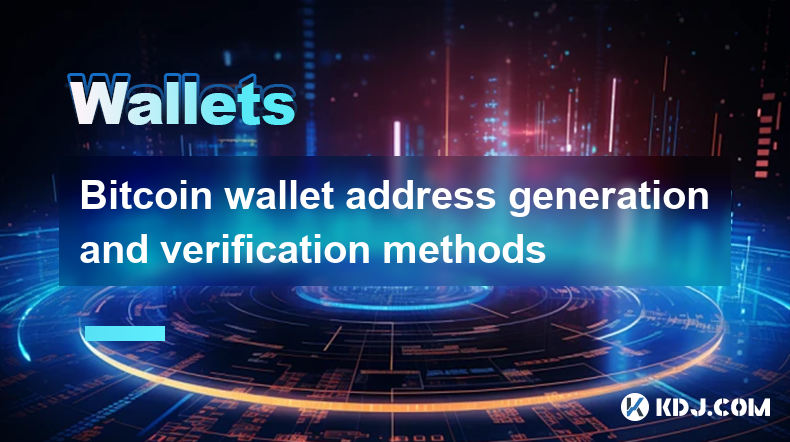
Bitcoin wallet address generation and verification methods
Apr 01,2025 at 11:01am
Understanding Bitcoin Wallet AddressesA Bitcoin wallet address is a unique identifier, similar to a bank account number, used to receive and send Bitcoin. It's a string of alphanumeric characters, crucial for participating in the Bitcoin network. Understanding how these addresses are generated and verified is paramount for secure Bitcoin transactions. ...
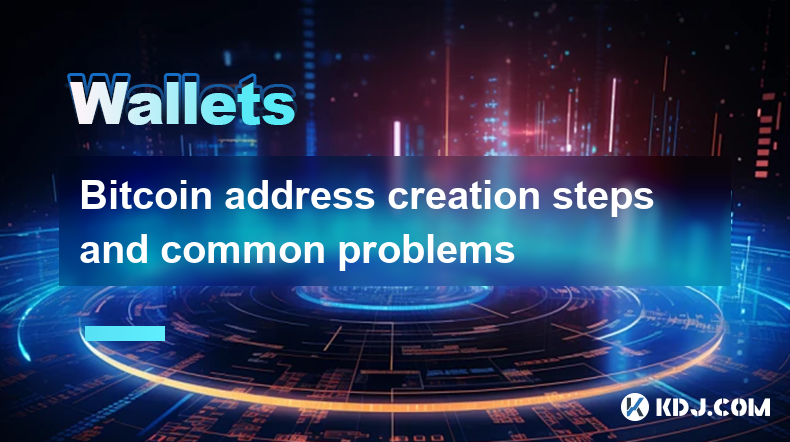
Bitcoin address creation steps and common problems
Mar 30,2025 at 06:07am
Understanding Bitcoin AddressesA Bitcoin address is a unique identifier, similar to a bank account number, used to receive Bitcoin. It's a string of alphanumeric characters generated from a public key, derived from your private key. Understanding the distinction between public and private keys is crucial for Bitcoin security. Your private key should be...
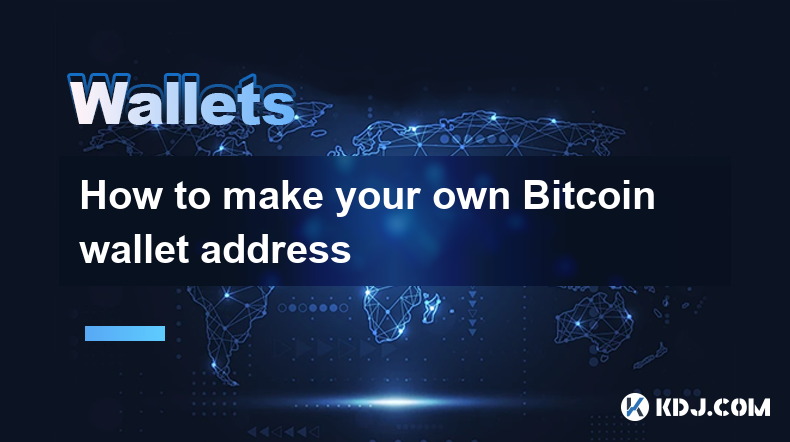
How to make your own Bitcoin wallet address
Mar 29,2025 at 08:42pm
Creating your own Bitcoin wallet address is crucial for securing and managing your Bitcoin holdings. It allows you to independently receive and send Bitcoin without relying on third-party services. This process involves understanding the different types of wallets and choosing the one that best suits your needs and technical expertise. Incorrectly gene...
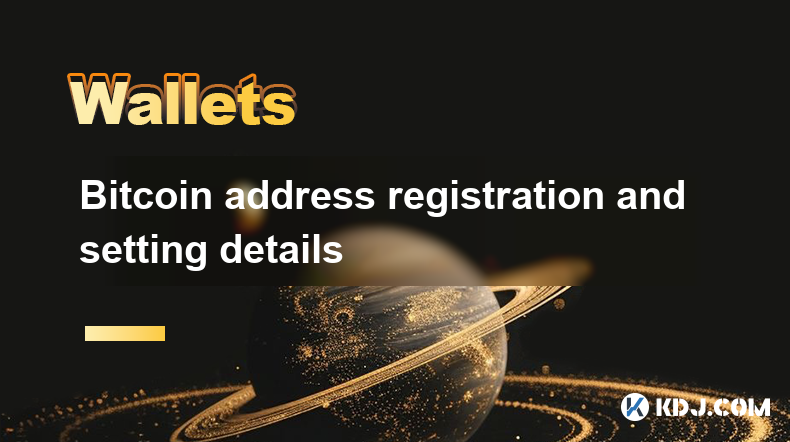
Bitcoin address registration and setting details
Apr 01,2025 at 01:28pm
Understanding Bitcoin AddressesA Bitcoin address isn't something you 'register' in the traditional sense. Unlike email addresses or usernames, you don't sign up for a Bitcoin address with a central authority. Instead, it's a cryptographic hash generated by your Bitcoin wallet software. This address acts as your public identifier on the Bitcoin network,...

Bitcoin wallet address creation and security management
Mar 31,2025 at 10:56pm
Understanding Bitcoin Wallet AddressesA Bitcoin wallet doesn't store Bitcoin directly. Instead, it stores private keys which are long strings of characters. These keys grant access to your Bitcoin. Your public key, derived from the private key, is used to generate your Bitcoin wallet address, a unique identifier similar to a bank account number. This a...

How to easily generate a Bitcoin payment address
Mar 29,2025 at 10:49am
Generating a Bitcoin payment address might seem daunting, but it's actually quite straightforward. This process is crucial for receiving Bitcoin, as each transaction requires a unique address. Understanding how this works is fundamental to using Bitcoin effectively. This guide will walk you through the simple steps, regardless of your technical experti...

Bitcoin wallet address generation and verification methods
Apr 01,2025 at 11:01am
Understanding Bitcoin Wallet AddressesA Bitcoin wallet address is a unique identifier, similar to a bank account number, used to receive and send Bitcoin. It's a string of alphanumeric characters, crucial for participating in the Bitcoin network. Understanding how these addresses are generated and verified is paramount for secure Bitcoin transactions. ...

Bitcoin address creation steps and common problems
Mar 30,2025 at 06:07am
Understanding Bitcoin AddressesA Bitcoin address is a unique identifier, similar to a bank account number, used to receive Bitcoin. It's a string of alphanumeric characters generated from a public key, derived from your private key. Understanding the distinction between public and private keys is crucial for Bitcoin security. Your private key should be...

How to make your own Bitcoin wallet address
Mar 29,2025 at 08:42pm
Creating your own Bitcoin wallet address is crucial for securing and managing your Bitcoin holdings. It allows you to independently receive and send Bitcoin without relying on third-party services. This process involves understanding the different types of wallets and choosing the one that best suits your needs and technical expertise. Incorrectly gene...

Bitcoin address registration and setting details
Apr 01,2025 at 01:28pm
Understanding Bitcoin AddressesA Bitcoin address isn't something you 'register' in the traditional sense. Unlike email addresses or usernames, you don't sign up for a Bitcoin address with a central authority. Instead, it's a cryptographic hash generated by your Bitcoin wallet software. This address acts as your public identifier on the Bitcoin network,...
See all articles























































































